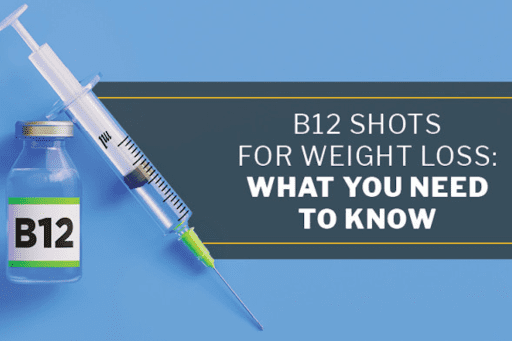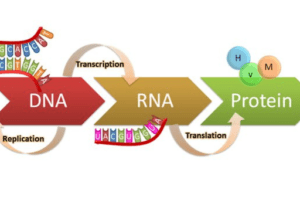You might have heard about people using B12 injections to help them lose weight. While it’s true that B12 is important for our bodies, it’s not a magic weight loss pill.

So, how does B12 fit into the weight loss puzzle?
Energy Booster: When you’re low on B12, you might feel tired and sluggish. And when you have more energy, you’re more likely to want to be active, which can help you burn calories.
Metabolism Helper: Some people believe that B12 might help your metabolism, which is your body’s way of turning food into energy. But more research is needed to be sure about this.
The Bottom Line:
- B12 is important for your overall health, and it can help you feel more energetic.
- While B12 might indirectly help with weight loss, it’s not a quick fix.
- For long-term weight loss, you need to focus on a healthy diet, regular exercise, and other lifestyle changes.
If you’re thinking about trying B12 injections for weight loss or any other reason, talk to your doctor first.
The Importance of Vitamin B12
Vitamin B12 is a vital nutrient that plays a crucial role in many essential bodily functions. It’s particularly important for:
- Red Blood Cell Production: B12 helps in the formation of red blood cells, which carry oxygen throughout your body. A deficiency can lead to anemia, causing symptoms like fatigue, weakness, and pale skin.
- Nerve Function: B12 plays a crucial role in nerve function. A deficiency can lead to nerve damage, resulting in numbness, tingling, and even balance problems.
- DNA Synthesis: B12 is involved in the process of DNA synthesis, which is crucial for cell growth and repair.
Who is at Risk for B12 Deficiency?
Specific populations are at increased risk of B12 deficiency.

- Vegetarians and Vegans: Plant-based foods are generally poor sources of B12. People following these diets may need to supplement or consume fortified foods.
- Older Adults: The body’s ability to absorb B12 from food can decline with age.
- People with Certain Medical Conditions: Conditions like Crohn’s disease, celiac disease, and pernicious anemia can interfere with B12 absorption.
Signs and Symptoms of B12 Deficiency
If you’re deficient in B12, you may experience the following symptoms:
- Fatigue
- Pale skin
- Weakness
- Weight loss
- Sore tongue
- Constipation
- Numbness or tingling in extremities
- Difficulty walking or maintaining balance
If you’re experiencing these symptoms, it’s important to consult with a healthcare provider to rule out a B12 deficiency.

B12 and Fatigue: A Common Link
A deficiency in vitamin B12 can often manifest as fatigue. This is because B12 plays a crucial role in the production of red blood cells, which carry oxygen throughout the body. When there is a shortage of B12, the body’s ability to produce sufficient red blood cells is compromised, resulting in a reduced oxygen supply to tissues and organs. This, in turn, can lead to feelings of tiredness and weakness.
Addressing B12 Deficiency for Increased Energy
By addressing a B12 deficiency through appropriate supplementation or dietary changes, individuals can often experience a noticeable improvement in their energy levels. This is because the body is better equipped to produce the necessary red blood cells, allowing for more efficient oxygen delivery to the tissues.
The Indirect Impact on Weight Loss
Increased energy levels can have a significant indirect impact on weight loss. When individuals feel more energized, they are more likely to engage in physical activity, which is essential for burning calories and promoting weight loss. Additionally, higher energy levels can make it easier to stick to a healthy diet and avoid unhealthy coping mechanisms such as emotional eating.
While B12 itself is not a direct cause of weight loss, it plays a crucial role in supporting overall health and well-being. By addressing B12 deficiencies and improving energy levels, individuals can create a more favorable environment for weight management and a healthier lifestyle.
B12 and Metabolism
While the exact relationship between B12 levels and metabolism is still under investigation, some studies suggest a potential link. It’s theorized that B12 may play a role in certain metabolic processes, such as the breakdown of carbohydrates and fats.
Limitations of Current Research
While there are indications of a possible connection, more research is necessary to definitively establish the extent to which B12 influences metabolism. Factors such as individual variations, genetic differences, and the presence of other underlying health conditions can complicate the study of this relationship.
Potential Benefits of Addressing B12 Deficiency
Theoretically, if B12 does indeed play a role in metabolic processes, addressing a deficiency could have indirect benefits for weight management. By optimizing B12 levels, the body may be better equipped to efficiently metabolize nutrients, potentially supporting weight loss efforts. However, it’s important to note that this is a speculative connection, and more research is needed to confirm its validity.
While the relationship between B12 and metabolism is an area of ongoing research, the potential benefits of addressing B12 deficiencies cannot be ruled out. However, it’s essential to approach this topic with caution and to consult with a healthcare professional for personalized advice on B12 supplementation and weight management.
While B12 injections can be helpful for people with B12 deficiencies, they’re not a magic bullet for weight loss.
It’s a Team Effort
To lose weight and keep it off, you need to make a few lifestyle changes. Adopting a healthy lifestyle can help. B12 injections can help, but they won’t do all the work.
Talk to Your Doctor First
Before starting any new supplement or treatment, it’s important to consult with your doctor. They can determine if B12 injections are right for you and provide personalized advice on how to reach your weight loss goals.
The Bottom Line on B12 and Weight Loss
B12 can boost your energy. When you’re feeling more energetic, you’re more likely to be active, which can help you lose weight.
B12 might help indirectly. While B12 might have some indirect benefits for weight loss, it’s not a guaranteed solution.
It’s all about balance. To lose weight and keep it off, you need to focus on a healthy diet, regular exercise, and other lifestyle changes.






